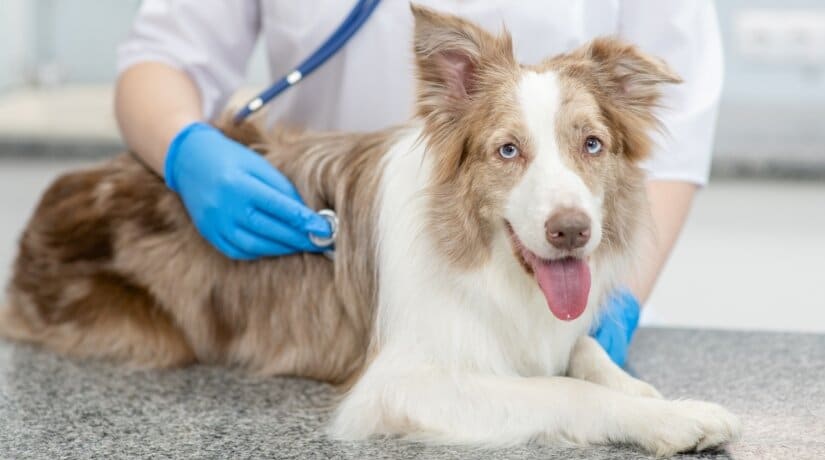Pneumonia is an inflammation of the lungs and airways that causes breathing difficulties and oxygen deficiency in the blood. There are many causes, with the most common cause being a viral infection of the lower respiratory tract. Pneumonia can be seen as the inflammation of the upper or lower respiratory tract.
If your furry best friend is coughing, having difficulty breathing together with a nasal discharge and lethargy, he may have pneumonia. If you suspect that your dog is affected with pneumonia, you’ll have to visit your vet for a complete diagnosis and treatment.
This blog will show you 9 key symptoms of pneumonia that you should never ignore so you can take quick action to care for your dog before his health goes downhill fast and he either chokes or gags from the fluid in his lungs. Here’s the take on dogs and pneumonia:
-
Easily Misdiagnosed
Pneumonia in dogs could easily be misdiagnosed as canine flu because your dog will have a cough and high fever; however, you might not notice other signs like dehydration and your dog’s increased heart rate… then, if you wait too long to get professional help from your veterinarian, you can put your dog at risk for dangerous, irreversible health issues like fluid in your dog’s lungs and aspiration which is life-threatening without intensive care treatment.
-
What is Pneumonia?
We’ve all heard about kennel cough and rabies, but it’s not often that we hear about pneumonia. Pneumonia in dogs falls under two categories:
- Microbial pneumonia (bacterial, fungal, or parasitic)
- Aspiration pneumonia (inhalation of foreign particles into the lungs)
With microbial occurring more often that’s usually of the bacterial kind, let’s take a look at some of the strains:
- Bordetella bronchiseptica
- Streptococcus zooepidemicus
- Pasteurella vcfcmultocida
- Pseudomonas aeruginosa
- Klebsiella pneumonia
- E. coli
- Mycoplasma
The bacterial strain that causes kennel cough, also known as Bordetella bronchiseptica, is the most contagious.
Dogs may get pneumonia as a secondary infection following a viral infection like the flu. You’ll also need to keep in mind that pollutants can weaken your dog’s immune system and may make them prone to getting pneumonia.
Here are some common pollutants that you should be aware of:
- Cigarette smoke
- Smog
- Mold particles
8 Causes of Pneumonia in Dogs
Your dog with pneumonia shows similar signs as a cold. There are numerous causes. The problem with pneumonia is that the fluids remain in your dog’s esophagus and can travel into his lungs. Quick treatment is needed to clear the fluid or treat with antibiotics to kill the bacteria.
These are 8 causes of canine pneumonia:
- Abnormalities: Your dog may have neuromuscular abnormalities that affect his muscles and nerves in his pharynx.
- Esophagus: Your dog’s lower esophagus may be enlarged from gastric acid, which results in regurgitation.
- Aspiration: Your dog may have inhaled a foreign object, and his lungs may be inflamed. This makes it hard for him to swallow.
- Obstruction: Your dog’s airways may be obstructed, and he inhales gastric acids that damage his lungs, which causes pneumonia in dogs.
- Bacteria: Your dog may have inhaled or eaten foreign matter that had bacteria, which caused an infection in his lungs.
- Viral: The most common cause is a viral infection of the lower respiratory tract. Canine distemper virus, adenovirus, and parainfluenza virus can damage the airways and make your dog susceptible to pneumonia.
- Parasitic: When there is a parasitic invasion of the bronchi, this can result in pneumonia. Tuberculosis pneumonia, although rare, may sometimes be seen in dogs.
- Fungal: This is a fungal infection of the lung that results in pneumonia. It can affect dogs with compromised immune systems and also healthy dogs. This takes a long time to occur and is accompanied by a short, moist cough with a thick discharge from the nose.
9 Key Symptoms of Pneumonia to Watch for in Your Dog

We love our dogs and understand how they generally behave. If you notice that your furry best friend has any of these symptoms, you’ll need to visit your emergency vet. There are numerous complications, and an immediate diagnosis is essential. Here are the signs of pneumonia in dogs.
- Lethargy: Your dog may seem weak and refuse to play or exercise
- Rapid breathing and increased heart rate
- Swallowing difficulties and regurgitation
- Coughing and vomiting
- Fever
- Nasal discharge
- Cyanosis: A blue tinge to your dog’s skin
- Change in behavior and mood
- Appetite loss
The most obvious signs of canine pneumonia include lethargy, appetite loss, bluish lips, labored breathing, and a deep cough. Your dog’s temperature may feel slightly increased.
Note:
- Take your dog to your local animal emergency hospital if your dog has any of these symptoms.
- Ask for a complete examination, including your dog’s lungs, chest x-rays, and blood work to show signs of pneumonia in dogs or an infection.
- Ask for a blood gas analysis to measure oxygen and carbon dioxide levels if your dog has breathing issues.
- Ask for a swallowing study to determine if your dog has any dysfunction of his esophagus.
Treatment of Canine Pneumonia

We adore our furry best friends and always want the best for them. If your dog is diagnosed with pneumonia, you’ll need to follow your vet’s instructions to the T. That means giving antibiotics at the right times and going back to your vet for frequent reexaminations. This will include periodic chest x-rays to check for possible complications. Your vet may do the following:
- Suction: Your dog may have inhaled or ingested foreign matter, which might require suction of his airways to remove the object or fluid in his throat.
- Oxygen: Your dog may need oxygen to stabilize his condition if he has breathing problems.
- Intravenous – Dehydration often occurs when fluids are prohibited due to pneumonia in dogs. This means your dog may require an intravenous to keep him hydrated.
- Rest: Your dog requires a quiet place to rest away from adults, children, and other pets in your home. You should also make sure your dog with pneumonia does not lie on his side for more than 2 hours.
- Light exercise: Your dog will benefit from light exercise when his condition improves to trigger a cough to clear his lungs and airways.
- Medication: Check with your veterinarian to see if your dog would benefit from an antibiotic or saline drip.
Now you’ve read about the 9 key symptoms of pneumonia in dogs as well as causes and treatment to help your dog before his condition becomes critical. It’s important not to ignore any signs of health problems to keep your dog well. As with all disease conditions, prevention is key, most especially for aspiration pneumonia, because the death rate is high. Affected dogs tend to develop lung abscesses. If your vet suspects that your furry best friend has inhaled a foreign substance, he’ll prescribe broad-spectrum antibiotics while waiting for signs of pneumonia to appear.
You should never ignore pneumonia symptoms in dogs because this disease becomes serious quickly and reduces recovery chances when you wait too long for medical treatment. Care and supportive treatment will be the same for other types of pneumonia.
Keep in mind that dogs with pneumonia benefit from a warm, dry environment. It’s also important to note that antibiotics cannot treat fungal pneumonia and other organisms. Your vet will have to make a definite diagnosis and identification of the fungus using lab tests, X-rays, and blood tests. As usual, keep your dog current on all vaccinations, and have your dog checked out for metastatic lung disease, of which symptoms are similar to pneumonia.
